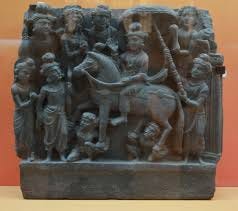The Wheel and the Cross: Three Views on Suffering
Commentary
Fulton Sheen once wrote, “Satan can appear in many disguises like Christ… but Satan never has and never will appear with scars. Only Heaven’s Love can show the marks of love’s greatest gift…” What was shame to the world, “foolishness to the Jews, a stumbling block to the gentiles” (1 Cor. 1:23), became the sole boast to the Christian, and the only ultimate answer to the problem that has bedeviled so many philosophies and civilizations: how to make sense of and respond to suffering.
Ancient civilizations struggled to deal with suffering. That suffering was a fact of life, they could not deny, but neither could they settle on how to deal with it. Mostly, they simply tried to avoid it. The Ancient Greeks perhaps summarized the options best with philosophies that included Epicureanism, Stoicism, and Skepticism. Seeking the best way to avoid suffering in a disappointing world, the Skeptic avoided any sort of intellectual commitment at all—the better to never have to take a firm stand. The Stoics rejected emotion and tried to follow virtue, though theirs was the dreary and tame virtue of Marcus Aurelius, who praised the good, ignored the bad, and lacked either the courage or commitment to make a moral revolution. Finally, the Epicureans sought merely to follow the path of pleasure, not necessarily a gross hedonism, but the avoidance of pain and suffering wherever possible.
Further East, from ancient times to today, Hinduism and Buddhism have had different ideas altogether. For them, the external world is a world of illusion, delusion, and suffering. The very first of Buddha’s “Noble” Truths is that the world is essentially suffering and misery. Suffering comes from desire, and desire from ignorance. Truth lies not without, but within. Hence Buddhist images are nearly always shown with Buddha’s eyes closed, looking inward. Why look outward? Truth and reality is found only within. There one looks, finds the true self, and escapes this world into Nirvana.
Unfortunately, Nirvana itself is a state of nonexistence, of (as Rodney Stark called it) metaphysical suicide, as one loses one’s own existence much like a drop of water absorbed into the ocean. In this view, everyone and everything else in the external world stands in the way, even one’s own family. A celebrated episode in Buddha’s life is “The Great Renunciation,” where he abandoned his wife and child as they slept; they were obstacles to his salvation from this world of suffering.

The Christian agrees with the pagan, both western and eastern, in holding suffering to be unnatural. It was not part of God’s original plan at all. Yet the modern world, without God and hence without real hope, has adopted many other pagan ideas in differing forms: the Skeptic’s denial of objective truth, the Epicurean’s desperate desire for continuous distractions and little pleasures, the egoist’s focus on the self and the sense that anything outside the self is an obstacle to me.
Against the Stoics’ dreary resignation, the Epicurean’s retreat to pleasure, the Buddhist or Hindu’s desperate escape into nothingness, Christianity offers the only real answer to suffering: a God who also has suffered. On the hill of Calvary, God planted himself on the cross like the banner of an army and dared evil to do its worst. Greater love, he said, no man hath, than to lay down one’s life for a friend. And greater love no god hath. This is why the devil has no scars, but the omnipotent God does; they are the wounds of love.
Christianity both confronts the reality of evil in a way that no other religion can, and offers hope for it in a way no other religion can.
Against Buddha, it denies that the world is essentially misery and suffering. Rather, God made the world and it is good; the suffering is a defect, a stain of a world that is fallen, but not beyond redemption. And so the Christian hope is not the escape of the eastern spiritualist, but redemption and union with the God on the cross and, one day, in heaven. If we have died with Him, St. Paul writes, So also we shall live with Him. The Son of God became man, not so that men would not suffer, but so that their sufferings would be like His. In contrast to Eastern beliefs, Christianity also denies that desire is the problem. The problem is not that our desires are too strong, but that they are too weak. As C.S. Lewis put it: “We are half-hearted creatures, fooling about with drink and sex and ambition when infinite joy is offered us, like an ignorant child who wants to go on making mud pies in a slum because he cannot imagine what is meant by the offer of a holiday at the sea.”
We fall too easily into the pagan, epicurean trap of seeking individual worldly pleasures, when we were made for the Infinite God and for Eternity. The feast follows the fast; the crown follows the cross; Easter Sunday follows Good Friday; and if the Christian walks the road to Calvary, he knows he does not walk it alone. The flag of his Divine Master was planted there first, and he need only follow his Captain faithfully.


